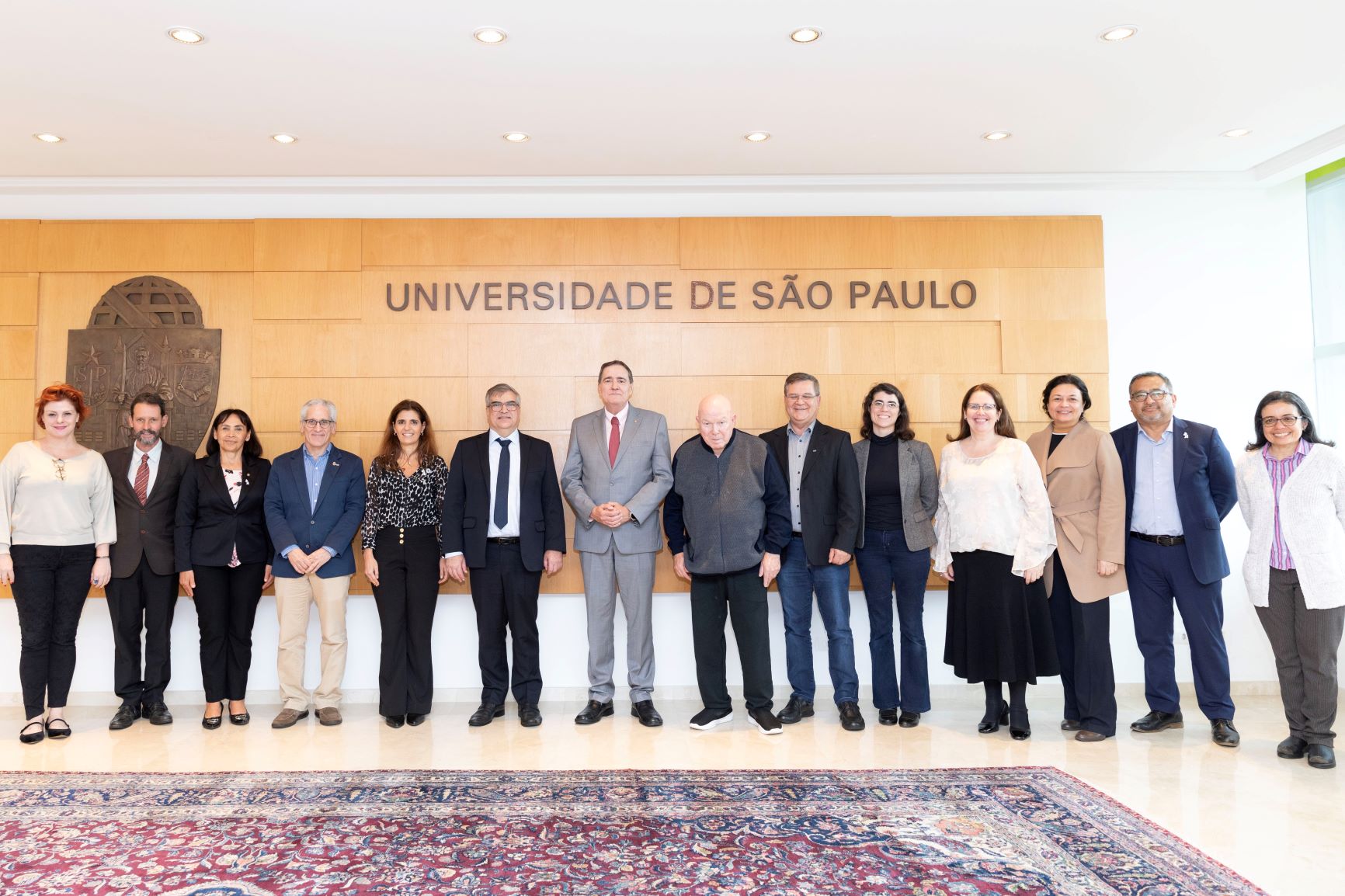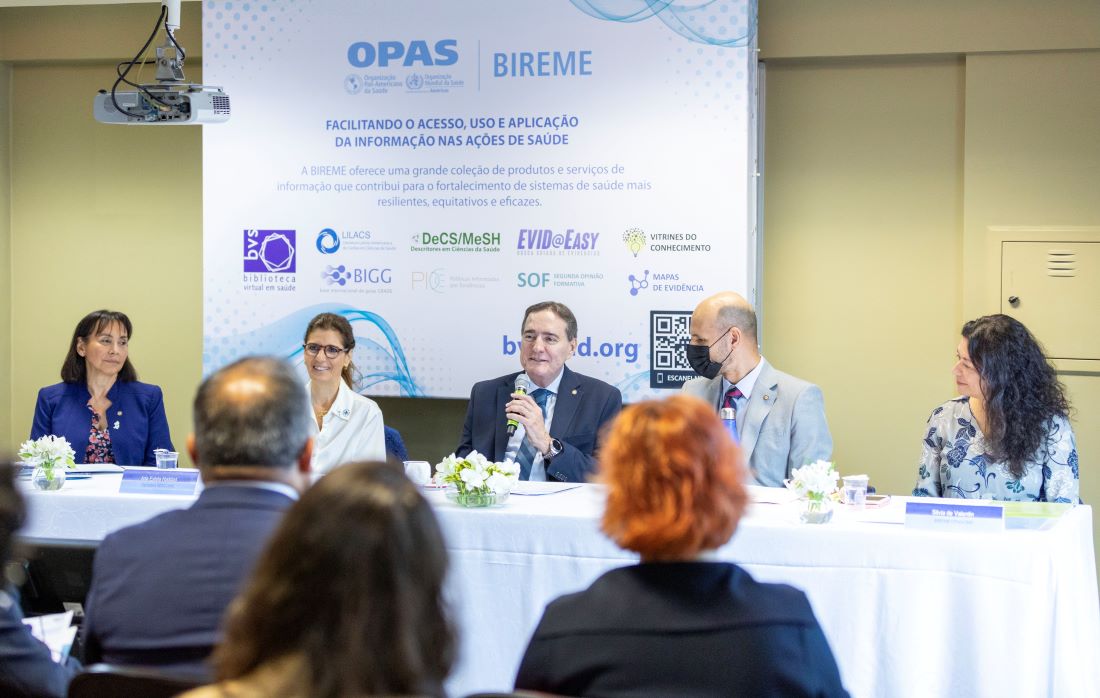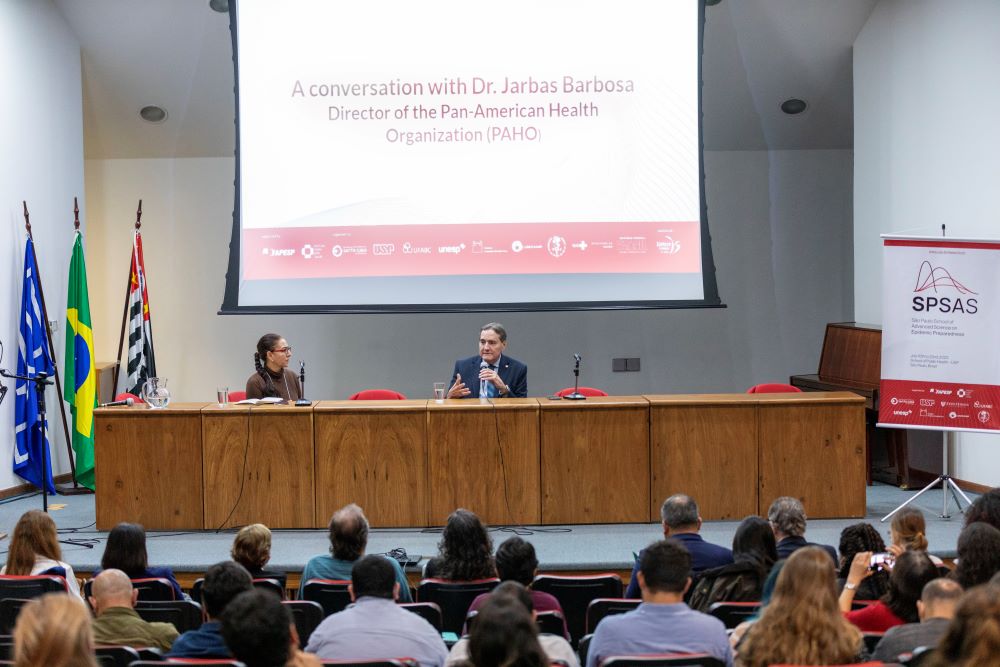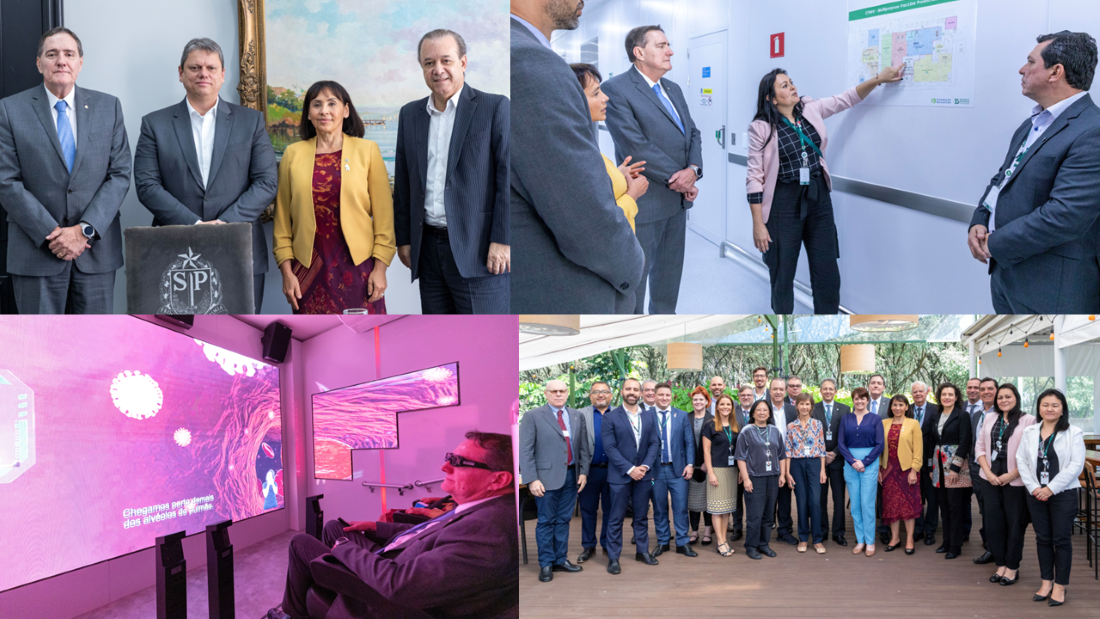During an official three-day visit to São Paulo, which also included the Latin American and Caribbean Center on Health Sciences Information/Pan American Health Organization/World Health Organization (BIREME/PAHO/WHO), PAHO Director, Dr. Jarbas Barbosa, focused on strengthening and expanding strategic institutional relations with universities, industry and government. In order to contribute to the strengthening of health in the state, in Brazil and in countries of the region, the mission highlighted topics such as: the lessons learned from the COVID-19 pandemic; the applications of digital transformation throughout the health production chain; and the need to reduce inequities in countries, promoting cooperation, synergies and solidarity between different sectors of society.
In the second week, Dr. Barbosa was in the campus of the University of São Paulo (USP), in a meeting with Prof. Eduardo Dias, coordinator of the Group of Electrical Automation in Industrial Systems (GAESI, acronym in Portuguese) and the Deputy Dean of Innovation at USP, Raul González Lima. With the rector Prof. Carlos Carlotti Junior, PAHO formalized a new agreement through which it can operate new projects with GAESI, PAHO/WHO Collaborating Centers at USP, and other research groups.

“This umbrella agreement has the potential to increase the number of PAHO/WHO Collaborating Centers at USP, and further qualify those that currently exist,” said Dr. Barbosa, noting that of the 19 Brazilian centers in operation, four are at the university: Ribeirão Preto School of Nursing; School of Medicine; School of Public Health and Center for the Study of Violence. The new cooperation with the GAESI of the Polytechnic School will focus on the development of information technology solutions for the health production chain.
At the meeting held at Federação das Indústrias do Estado de São Paulo (FIESP), with the Committee of the Productive and Economic Complex of Health and Biotechnology (ComSaude), strategies were discussed to expand the capacity of Brazilian industry and strengthen domestic and international trade in national products and inputs. Dr. Barbosa emphasized PAHO/WHO’s mission to expand the access of populations and health systems in the region to the benefits of new technologies and strategies applied to the sector, highlighting the relevance of intersectoral cooperation and solidarity between countries and regions. With Mariângela Simão, director of the Instituto Todos Pela Saúde, the agenda noted projects for the preparation, monitoring, response and recovery of global health emergencies, including the strengthening of genomic surveillance and the One Health approach: animal-human-environment.

The morning of July 11th was reserved for the visit to BIREME, where Dr. Barbosa could learn the details of the 2023-2025 Strategy led by BIREME Director João Paulo Souza and an overview of the operation and highlights of the Center’s technical cooperation, presented by the Managers, Silvia Almeida de Valentin (A&PP), Verônica Abdala (PSI) and Sandra Janostiac (DEV). The strategy, which will be part of the Biannual Work Plan 2024-2025, aims to facilitate the digital transformation of BIREME’s information and health products and services to meet the characteristics and attributes of Industry 4.0.
The PWR Brazil, Dr. Socorro Gross, congratulated BIREME for its historic contribution, and considering that the current health priorities in the Americas give “renewed relevance to the work of this which is the PAHO/WHO Specialized Centre for health information”. Also invited to the table, Ana Estela Haddad, Secretary of Digital Health of the Ministry of Health (SEIDIGI – Portuguese acronym), shared her thanks and willingness to improve telehealth technologies.
Information on management, technical cooperation and development of the VHL Network (Virtual Health Library) was provided to those present. More than 50 people attended the event, including managers, technicians from BIREME and PAHO Brazil, and coordinators of the VHLs, among them: Eno Dias de Castro Filho (VHL PHC), Francisco Lana (VHL Nursing), Mariana Cabral Schveitzer (VHL TCIM) and Jose Luiz Gomes do Amaral (VHL RIC). For the coordinator of the SMS-SP VHL, Lucia Langanke, it was an opportunity to share how cooperation with BIREME facilitates the work of management: “The VHL is an important communication tool, as it concentrates information with various arrangements that facilitate the workers’ search for protocols and guidelines of the Secretariat of Health, seeking to ensure safe and quality health care.”

On Tuesday afternoon, in a meeting with the Congregation of the Faculty of Public Health of USP, Dr. Barbosa reaffirmed PAHO/WHO’s commitment to strengthening multisectoral social policies that positively impact the health and quality of life of the peoples of the Americas. He also highlighted the goal of applying lessons learned from COVID-19 for a more comprehensive and equitable public health response in future health emergencies. The Director also participated in the international seminar organized by the São Paulo School of Advanced Science in Epidemic Preparedness, addressing the complex health landscape in the region.
At Palácio dos Bandeirantes, Dr. Barbosa met with the Governor of São Paulo, Tarcísio de Freitas, and the Secretary of Health, Eleuses Paiva, to establish a technical cooperation with the aim of contributing to improving the efficiency of the health system in the state. The new Cooperation Agreement considers three priority axes, including the regionalization of initiatives, digital health applications and the strengthening of the industrial complex to improve regional health management and care. During the visit of the PAHO delegation to the Instituto Butantan (IB), Dr. Barbosa also spoke with the IB director, Dr. Esper Kallás, about the expansion of the production and supply of vaccines and serums to countries in the Americas through the Organization Revolving Fund.

The PAHO Director’s visit to Brazil ended on July 14, with the last activities accompanied by the team from the Pan American Center for Foot-and-Mouth Disease and Veterinary Public Health (PANAFTOSA), in Rio de Janeiro, where activities were carried out with government authorities and the Fundação Oswaldo Cruz (FIOCRUZ) and with the Center’s team.
Links of interest:
PAHO Director meets with Brazilian President to discuss public health priorities
Agreement with Poli strengthens USP’s partnership with Pan American Health Organization (available in Portuguese)
PAHO Director Jarbas Barbosa visits Butantan Science Park and manufacturing plant (available in Portuguese)
In a visit to Fiocruz, PAHO signs two cooperation agreements and honors the Foundation (available in Portuguese)